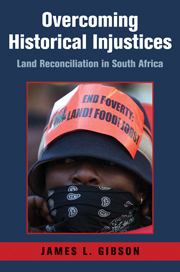Book contents
- Frontmatter
- Contents
- List of Figures
- List of Tables
- Preface and Acknowledgments
- 1 Land Reconciliation and Theories of Justice, Past and Present
- 2 Naming, Blaming, and Claiming on Historical Land Injustices: The Views of the South African People
- 3 Group Identities and Land Policy Preferences
- 4 Applied Justice Judgments: The Problem of Squatting
- 5 Judging the Past: Historical versus Contemporary Claims to Land
- 6 Land Reconciliation and Theories of Justice
- Appendix A A Note on Race in South Africa
- Appendix B The Survey Methodology
- Appendix C The Questionnaire
- References
- Index
- CAMBRIDGE STUDIES IN PUBLIC OPINION AND POLITICAL PSYCHOLOGY
Appendix B - The Survey Methodology
Published online by Cambridge University Press: 27 July 2009
- Frontmatter
- Contents
- List of Figures
- List of Tables
- Preface and Acknowledgments
- 1 Land Reconciliation and Theories of Justice, Past and Present
- 2 Naming, Blaming, and Claiming on Historical Land Injustices: The Views of the South African People
- 3 Group Identities and Land Policy Preferences
- 4 Applied Justice Judgments: The Problem of Squatting
- 5 Judging the Past: Historical versus Contemporary Claims to Land
- 6 Land Reconciliation and Theories of Justice
- Appendix A A Note on Race in South Africa
- Appendix B The Survey Methodology
- Appendix C The Questionnaire
- References
- Index
- CAMBRIDGE STUDIES IN PUBLIC OPINION AND POLITICAL PSYCHOLOGY
Summary
The survey blends probability and quota methods of respondent selection, and therefore requires discussion of the two portions of the research design separately. The samples, however, do begin from a common sampling frame.
The survey firm Markinor first stratified each South African location according to province, community size, individual city, town or rural areas, suburb (within the large cities), and the predominant race of the residents of the area. Strong residential segregation makes the latter variable much less ambiguous than might otherwise be the case. Within each stratum, sampling points were randomly selected. Within each sampling point, either four or six interviews were conducted.
For the black subsample, area probability methods were then used. Households were enumerated and one was randomly selected. Within the chosen household, an adult individual was also chosen randomly. Up to four attempts were made to interview the designated individual. No respondent substitution was allowed. Gender stratification was imposed, however, to ensure against over-representation of females. This means that within each household, the gender of the respondent was predetermined. Thus, the African subsample was drawn via standard area probability methods.
Out of the 1,778 designated individual Africans, interviews were completed with 1,549, for a raw response rate of 87.1%. Of the 229 households in which no interview was conducted, this was due to the designated respondent being sick, deaf, or blind in 21 instances, and to a language barrier in another three cases.
- Type
- Chapter
- Information
- Overcoming Historical InjusticesLand Reconciliation in South Africa, pp. 221 - 226Publisher: Cambridge University PressPrint publication year: 2009



